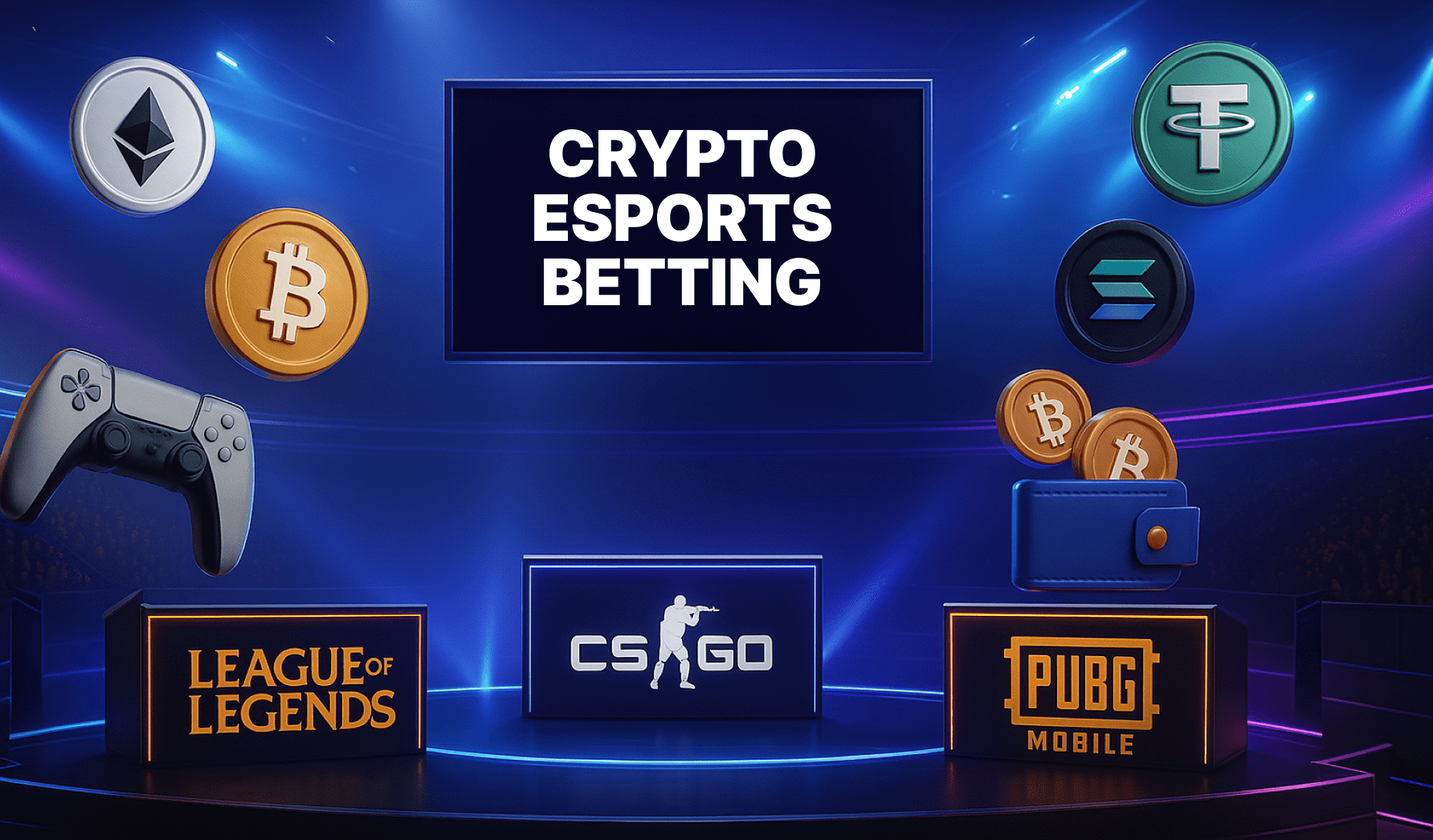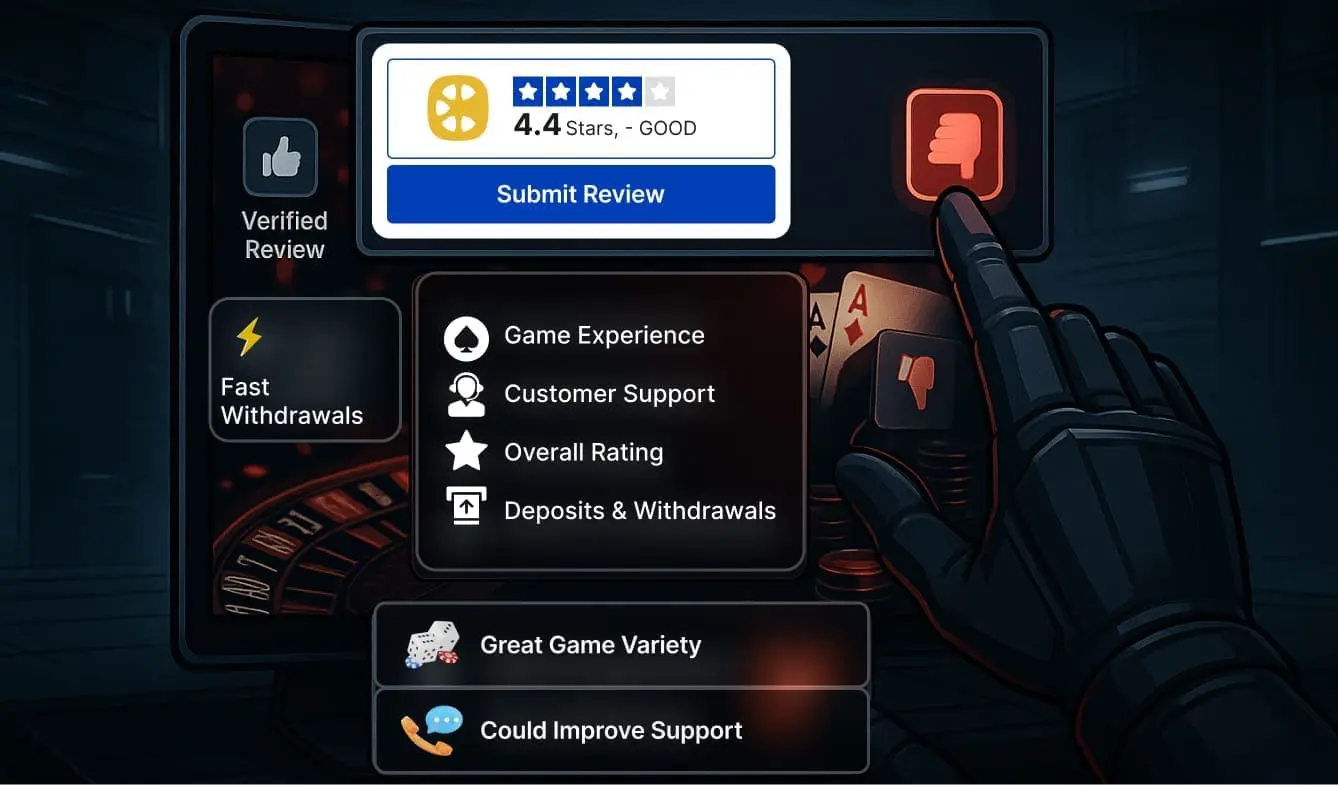
Crypto Gambling Scams: What to Watch Out For (Before You Get Rekt)
Let’s be real: crypto gambling might look shiny and futuristic, but it’s also the Wild West in a Gucci tracksuit. Sure, there are legit casino platforms pushing the boundaries with provably fair tech, massive bonuses, and genuinely decentralized features. But for every decent operator, there’s a dodgy outfit waiting to snatch your coins and vanish into the blockchain ether.
Why? Because crypto payments are irreversible. There’s no chargeback, no angry call to Visa, no friendly regulator holding your hand. Once you click “send,” it’s gone – whether you’ve sent it to a real casino or a scam site run out of someone’s mum’s basement.
In this original CoinBets guide, we’ll expose the most common crypto gambling scams, from fake casinos and rigged games to bonus traps and exit scams. More importantly, we’ll show you how to avoid them – and keep your precious sats where they belong: in your wallet, not theirs.
Crypto Casinos Are Booming — So Are the Scams
From $500M to $9B in just 4 years — but not all growth is legit.
💸 $1B+ Lost to Crypto Casino Scams in 2023
🚨 1 in 5 new casinos show red flags — shady licenses, fake games, or no withdrawals.
Common Scams in Crypto Gambling
As with all things online, crypto gambling scams come in many different forms, but here we’ll take a look at some of the most common crypto casino and sports betting scams, and the red flags to watch out for.
Fake Casinos
One of the most common scams in crypto gambling is that some online casinos are straight-up fake. Yes, they will have games that are playable and may look convincing, but if you try and withdraw winnings you will hit a brick wall.
Unscrupulous operators set them up to trick unwary players into depositing, then simply refuse to pay out winnings and usually disappear into the night. Of course, this has always been an issue with offshore online casinos, but it’s particularly bad when it comes to crypto casinos.
Unscrupulous operators set them up to trick unwary players into depositing, then simply refuse to pay out winnings and usually disappear into the night.
Red flags to watch for:
- Missing or fake licensing information (carry on reading to find out how to check licenses)
- No information about the operating company
- Poorly designed website and odd casino name (fake casino operators tend to be cheapskates)
- Terms and conditions are missing or hard to find and badly written
- Odd choice of games and software providers
- No blockchain-based provably fair games
- Lack of responsible gambling tools
- Limited payment options
- No information about auditing or memberships of industry associations

Fake Casinos
- No Real License
- No Company Details
- Sketchy Design or Weird Name
- Missing or Shady Terms & Conditions
- Limited or Suspicious Payment Options
- No Provably Fair System
- No Responsible Gambling Tools
- No Audit Trail or Reputation

Cloned Casinos
Unfortunately, these days it is extremely easy for criminals to clone entire sites. This happens with everything from casinos to financial services.
A fraudulent site will look virtually identical to the legitimate site it is cloning and has one purpose – to steal your crypto and information. Yep, in addition to losing your funds, if you enter your personal details on one of these sites, it will probably be sold on the dark web.
What to look for:
- Check the URL – Look for spelling discrepancies or a strange domain. For example, if you are visiting leovegas.com, the address should start with exactly that).
- Look for visual and branding errors – crooks are often in a hurry and make mistakes.
- Test links to things like licenses – at fake sites, they probably won’t work.
Scammers use small typos to trick players
Phishing Attacks and Social Engineering
One of the most common ways for criminals to steal information and money online is via so- called ‘phishing attacks.’ This is when fraudsters pose as someone else to try and obtain your sensitive information.
Unfortunately, phishing attacks are becoming increasingly sophisticated. In fact, over recent years, crooks have taken things to a new level with so called “social engineering.” This can involve elaborate efforts to befriend targets on social media to build trust, before hitting them with a scam.
In fact, over recent years, crooks have taken things to a new level with so called “social engineering.” This can involve elaborate efforts to befriend targets on social media to build trust, before hitting them with a scam.
Usually, phishing takes place via email, but criminals also use phone calls and messages, including SMS, WhatsApp, Skype, Facebook, Telegram and other platforms. The rule to remember is, never click on a link in an email or message.
Instead, go directly to the site via your browser (double-checking the URL), log in to your account, and then check messages directly on-site. If it was a legitimate message from a casino, It should be in your account inbox. And, of course, never share sensitive information, including usernames, passwords, other log in credentials, payment information, and seed phrases.
Oh, and don’t believe that hot blonde “OnlyFans model” when she randomly befriends you on Facebook and starts talking about casinos.
Red flags to watch for:
- Unsolicited emails, phone calls and messages
- Any email or message asking you to click a link or respond with personal information
- Messages from private or spoofed email addresses (legitimate marketing communications will come from the official casino or sportsbook domain)
- Badly written messages laced with errors and awkward phrases
- Implausibly attractive people befriending you “out of the blue” on social media
Phishing Attack Flow
1. Unsolicited email/message.
2. Click on a malicious link.
3. Enter sensitive information.
4. Information is stolen and crypto is stolen.
There’s no “Undo” in crypto. One click can drain everything.
Rigged Games
Legitimate crypto casinos will usually provide games from well-known and reputable software providers, like NetEnt, Pragmatic Play, Hacksaw Gaming, NoLimit City, and Play’n GO.
The RTP (return to player %) of each game should be provided – either on the game thumbnail or an information page. These RTP rates can also be checked at the official sites of the game providers themselves.
Unfortunately, dodgy crypto casino operators have been known to tamper with RNG (random number generator) based games, especially slots, to reduce the RTP, or even make them impossible to win.
The best way to avoid these is to play at a site with a reputable license and good reputation among the player community (like here at CoinBets). Many regulators, like the UK Gambling Commission (UKGC), Malta Gambling Authority (MGA), and the Curacao Gaming Authority (CGA) require casino operators to undergo regular audits from specialist independent game testing labs like iTech Labs or eCOGRA.
We’ll cover casino regulators in more detail in a moment.
Red flags to watch for:
- Games from unknown or obscure software providers
- RTP is not provided for games
- No information about third-party audits or testing
- No provably fair games are available
Legitimate Crypto
Casino Games
Known Game Providers
Clear RTP (Return to Player)
Third Party Audits
Provably Fair Systems
Rigged Crypto
Casino Games
Unknown or Fake Providers
No RTP Listed
No Game Audits
No Provably Fair Games
🧠 Spot the Scam Before You Play If you can’t verify the game provider, RTP, or audit trail — don;t touch it. The best crypto casinos prove fairness up front.
Withdrawal Scams
Okay, so this is a difficult one. With today’s regulatory environment getting tighter by the day, many licensed casinos are required to verify identities before processing withdrawals. This is to comply with Know Your Customer (KYC) and Anti-Money Laundering (AML) laws.
Exactly how strict these requirements are will vary by jurisdiction. For example, from mid-2025, Curaçao-licensed casinos were required to verify player identities before processing their first withdrawals – regardless of the amount.
But regardless of the specific requirements, KYC checks add friction and can be frustrating for players. In fact, the most common complaints on casino review sites are about verification processes. Unfortunately, but quite predictably, bad actors have taken advantage of this situation and use KYC as an excuse to either delay payouts or not pay out at all.
Unfortunately, but quite predictably, bad actors have taken advantage of this situation and use KYC as an excuse to either delay payouts or not pay out at all.
Thankfully, there are ways to spot crypto casinos that are likely to make life difficult when trying to withdraw winnings.
Red flags to watch for:
- Withdrawal processing times not clearly stated upfront
- Lack of information about the account verification process
- Unreasonable terms (usually buried deep in the small print)
- Unresponsive customer support
Bonus Scams
When it comes to crypto casinos, everyone is looking for great bonuses. And, for sure, you’ll find some incredible welcome bonuses, reload bonuses, free spins, and cashback offers at the best casinos.
But, as the old adage goes, if something sounds too good to be true, then it probably is.
This issue gets muddier when you take into account that not all bonus scams are technically breaking any rules. Some just have such ridiculous terms or high wagering requirements, that unless you’ve got a millionaire’s bankroll, you’re probably not going to benefit much
Some just have such ridiculous terms or insanely high wagering requirements, that unless you’ve got a millionaire’s bankroll, you’re probably not going to benefit much
Here’s a typical example. Let’s say a crypto casino is offering a 100% deposit bonus of up to $10,000 (or equivalent in BTC). All sounds amazing, right?
But, it has a 50x wagering requirement. And, it gets worse, that wagering is on the total of the deposit + bonus. And, worse still, you’ve got just seven days to complete the wagering, or you forfeit it.
This means if you deposited $1,000 and got a $1,000 bonus, you’d have to then play through $100,000, within seven days, before you could cash out. And, if you deposited $10,000 and got a $10,000 bonus, you’d have to wager an insane $1 million within the same time frame.
So, be suspicious of:
- Very large bonuses
- Overly complicated bonuses
- High and/or misrepresented wagering requirements
- Short timeframes to complete wagering
- Hard to find or poorly written terms and conditions
The Bonus Trap: Why Big Offers Usually Mean Big Trouble
Deposit $1,000, Get $1,000 Free? Sounds Amazing.
You double your money… or so it seems.
You now need to bet $100,000 just to cash out your $1K.
7 Days to Wager $100,000
Deposit $10,000 and chase a matching bonus? You’ll need to wager $1,000,000.
Look out for:
How to Avoid Crypto Casino Scams
Okay, so we’ve covered the most common types of online casino scams to watch for, so let’s go through how you can avoid them.
Do Your Homework
Research. Read reviews before you spend any money online. Whether it’s buying insurance or depositing at a casino, it pays to do your research first.
Unfortunately, when it comes to crypto casinos, this isn’t as simple as it sounds.
One of the main problems is affiliate marketing. The vast majority of online crypto casinos promote themselves via affiliate marketing. This is when marketers earn a commission for every new player they send to a casino.
Of course, there’s nothing wrong with this – if it is done right. Some affiliates are honest(ish), and this kind of marketing takes place across every industry (social media is full of it). But the crypto casino space is increasingly flooded with fake, inaccurate and highly biased “reviews” and “guides.”
And, don’t forget that some reviews will have been left by disgruntled sore losers, or even casino operators trying to give their competitors a bad name.
The best strategy is to check several different review sites (as long as it includes CoinBets, of course). Read both the official reviews and the comments and feedback from individual players. Don’t put too much weight on any single review, but rather try and get a general vibe.
Read both the official reviews and the comments and feedback from individual players. Don’t put too much weight on any single review, but rather try and get a general vibe.
Here are some popular casino review sites that you can check:
- AskGamblers – one of the world’s biggest online casino review sites
- Casino Guru – a decent source for reviews and guides
- Casino.org – a large, well-established casino review site
- Trustpilot – user reviews of everything online, including crypto casinos
But do remember, that the first three in that list are affiliate marketers.
-

AskGamblers
One of the biggest names in the game — known for listing complaints and user reviews.
-

Casino Guru
A great source for reviews and guides
-

Casino.org
A large, well-established casino review site
-

Trustpilot
User reviews of everything online, including crypto casinos
Check Licenses and Regulation
One of the best ways to avoid dodgy crypto casinos is to only play at sites licensed by a reputable gambling regulator.
Online casinos will usually proudly display their licenses in the form of logos and links in the page footer. Normally, clicking on the license logo will take you to more detailed information. You can always check if this information is valid by going to the gaming regulator’s official site.
Normally, clicking on the license logo will take you to more detailed information. You can always check if this information is valid by going to the gaming regulator’s official site.
As things stand, only a handful of jurisdictions will license crypto casinos. By far the most established of these is Curaçao, although Anjouan, Tobique, and Kahnawake are also fairly common.
The Malta Gaming Authority (MGA) is trialing crypto gambling licenses, but most MGA-licensed casinos are fiat-only. At the moment, casinos and sportsbooks licensed by tier-1 regulators like those in the UK, the Netherlands, and Sweden are effectively barred from accepting crypto.
Here’s a quick guide to the licenses you’re likely to find at crypto casinos:
Common Crypto Casino Regulators
Curaçao Gaming Authority (CGA)
Until recently, the online gambling licensing system in Curaçao was very complicated. Instead of the government directly issuing licenses, four master license holders were authorized to issue sub-licenses. These were; Cyberluck Curacao N.V. (Curacao-eGaming); Gaming Curacao (GC); Curacao Interactive Licensing N.V. (CIL); and Antillephone.
Unsurprisingly, this system was inefficient and gave the jurisdiction a poor reputation. So, in 2023, with the help of Dutch and Maltese advisors, the Caribbean nation set up the Curaçao Gaming Control Board (CGCB) – which has since rebranded as the Curaçao Gaming Authority (CGA).
Now, all new licenses are issued directly by the CGA, and regulatory standards, especially regarding player protection, have significantly improved. You can check the validity of any Curaçao online casino license at the official CGA site.
Kahnawake Gaming Commission
Established way back in 1996, long before crypto, the Kahnawake Gaming Commission (KGC) is based in the Mohawk Territory of Kahnawake in Quebec, Canada.
The KGC has issued licenses to hundreds of gambling operators and earned a good reputation for integrity. Illustrating this, the Canadian federal government in Ottawa has never attempted to interfere with the KGC’s activities. You can check licenses at the official KGC site.
Anjouan Gaming (Comoros)
Anjouan is an autonomous region of the Comoros Islands – an impoverished and underdeveloped archipelago nation in the Indian Ocean.
The authorities there have been issuing online gambling licenses for a number of years, but recently many crypto casinos, unable or unwilling to comply with the new regulatory regime in Curaçao, have registered there. However, the value of an Anjouan online gaming license is questionable at best.
You can check licenses at Anjouan Gaming.
Tobique Gaming Commission
A tiny First Nation located within the Canadian province of New Brunswick, Tobique began issuing online gambling licenses in 2024. By mid 2025, the jurisdiction had attracted hundreds of licensees – including many former Curaçao license holders.
License statuses can be checked at the official Tobique Gaming Commission website.
St Kitts and Nevis
St Kitts and Nevis are two islands in the Caribbean. Together, they form one country, but each island has a high degree of autonomy. As of late 2025, each island had established its own gaming regulator and started issuing licenses.
Estonian Tax & Customs Board
A rare example of a European regulator that will license crypto casinos, the Estonian Tax and Customs Board (ETCB) is something of a trailblazer but well respected. You can check online casino licenses at the official TCB site.
Other Jurisdictions
As with cryptocurrency exchanges, some crypto casinos have opted to license themselves in remote, little-known countries to evade regulatory oversight. While some of them do technically have regulators, in practice these licenses mean next to nothing and offer virtually no player protection.
For example, you may see licenses from the Seychelles, Vanuatu, and Micronesia.
Some crypto casinos are also operated from countries in Latin America, like Costa Rica and Panama. However, as a rule, these don’t even claim to have any license – just a registered operating company.
How to Verify a Crypto Casino License
🟢 Step 1: Check the Footer
Scroll to the bottom of the site. Look for licensing logos from trusted authorities like Curaçao, MGA, or Kahnawake. No logo? 🚩 Walk away.
🔵 Step 2: Click the Logo
Legit license badges should link to a real license page. No link or it goes nowhere? It’s probably fake.
⚪ Step 3: Verify on the Regulator’s Site
Go to the actual regulator’s site(like gcb.cw) and use their search tool. If the casino isn’t listed, it’s not licensed.
Provably Fair Gaming
For the ultimate guarantee of fairness, you can look for provably fair games.
These allow you to personally check the hashes, logged on the immutable public ledger, after each round. Because provably fair games incorporate blockchain-based decentralized technology, theoretically, operators shouldn’t be able to rig them.
Because provably fair games incorporate blockchain-based decentralized technology, theoretically, operators shouldn’t be able to rig them.
It should be noted that some casinos use the term “provably fair” rather liberally in their marketing and SEO efforts – even if the platform doesn’t actually offer any.
True provably fair games use cryptographic techniques, in the form of hashed seeds (player and server), to demonstrate that the outcome of any given round is truly random.
Leading provably fair game providers include Spribe, Turbo Games, InOut, and BGaming. Many of the best crypto casinos also offer their own “in-house” provably fair original games (although, in reality these are often just reskinned games from providers like InOut).
Follow Secure Practices
In addition to taking steps to verify the legitimacy of a specific crypto casino, there are several things you should do to keep your information and funds safe.
- Check the casino site itself is secure. To do this on Chrome, click the little circle with slider icons in the address bar. You want to see a padlock with the text ‘Connection is secure’.
- Always use strong passwords. Use a combination of upper and lower case letters, numbers, and special symbols. If you think your password has been compromised, change it immediately and notify the casino.
- Use two-factor authentication. If 2FA is available, use it. This could mean using the Google Authenticator app, SMS codes, or email links. It will make it much more difficult for someone to hack your casino account.
- Manage your account balance carefully. Make sure you are aware of how much you have in your casino account. Don’t leave large amounts sitting in your casino account. Withdraw your crypto winnings to a secure non-custodial wallet regularly. Remember the saying “Not your keys, not your crypto.”
Look For the Red Flags
It’s important not to get paranoid about crypto casino scams. Most crypto casinos, including many of those reviewed here at CoinBets, provide good service and great entertainment.
However, you should always be looking for red flags and approach all promotional offers with a healthy dose of skepticism. Never rush into depositing funds, and make sure you always read the terms and conditions.
Never rush into depositing funds, and make sure you always read the terms and conditions.
Remember, if a bonus seems too good to be true, it most likely is.
One red flag shouldn’t necessarily write a casino off. Sometimes there are good reasons. For example, a new casino may only have a few game providers and payment options, and probably won’t have many reviews. But, if those red flags start stacking up, it’s best to move on.
There are plenty of great crypto casinos out there. You should only be gambling on the games, not the casino itself.
Red Flags = Run Fast
Vague or Missing Terms
Bonuses That Look Too Good
Unknown Game Providers
Watch for Stacking Red Flags
One red flag? Be cautious.
Two or more? Get out. Don’t rationalize it — just leave.
Join The Conversation
No comments yet. Be the first to comment!
 Continue with Apple
Continue with Apple Continue with Google
Continue with Google







Comments (0)
Share